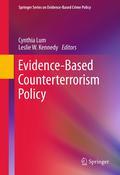El artículo ha sido añadido

In the past eight years, there has been a massive increase in government spending on counterterrorism intervention development and implementation. Given this increase, there are two evidence-based policy questions that are important to address:.
- ISBN: 978-1-4614-0952-6
- Editorial: Springer New York
- Encuadernacion: Cartoné
- Páginas: 385
- Fecha Publicación: 28/10/2011
- Nº Volúmenes: 1
- Idioma: Inglés
